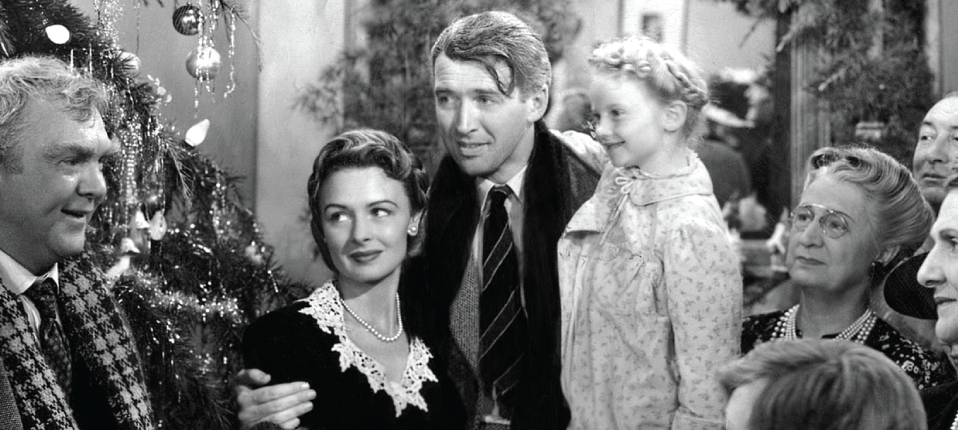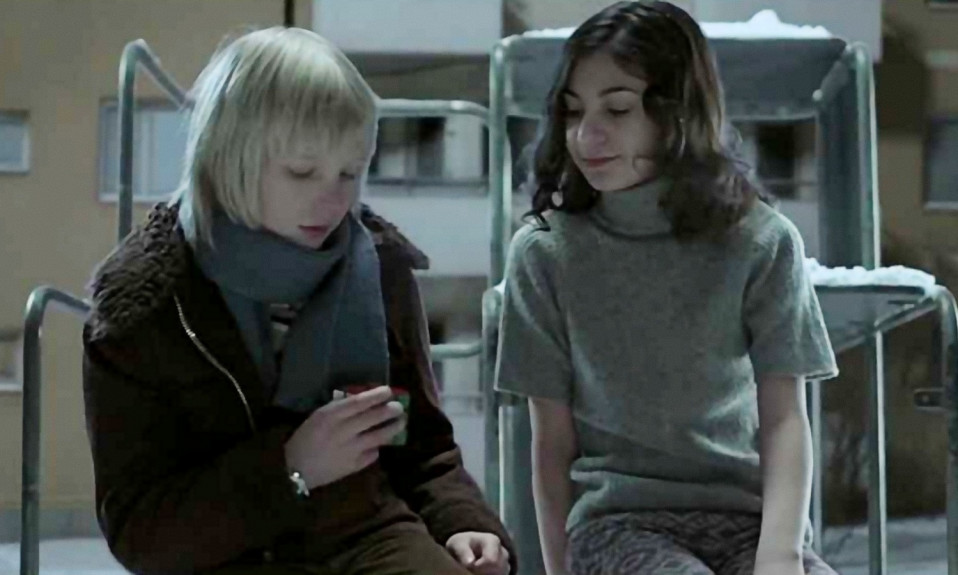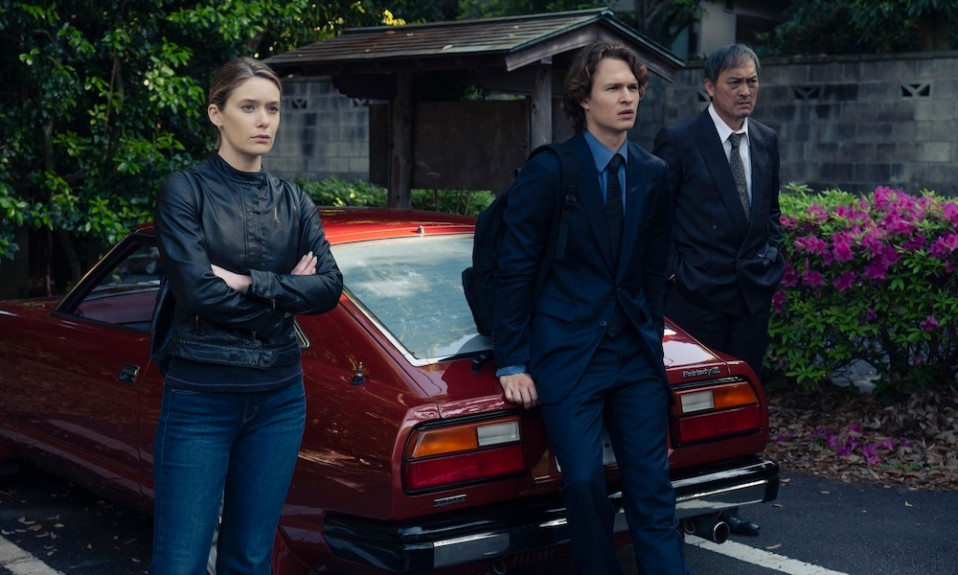With the big day fast approaching its time to review another one of my all-time favorite Christmas movies. But this is not just any Christmas movie. This is arguably not only the greatest Christmas movie ever, but one of the greatest movies of all time, period. So, join me as we look back at Frank Capra’s seminal classic, It’s a wonderful life.
The Story
Clarence, an angel hoping to get his wings, is tasked with saving George Bailey (James Stewart) from committing suicide on Christmas Eve. To figure out how to help him, Clarence looks back over George’s life. He finds that George has always put others before himself. From saving his brother from drowning when he was a child to taking over the family business when is father died. Thus, saving the town from being monopolized by the cruel Mr. Potter (Lionel Barrymore). But because of this he always missed out on personal opportunities. When the threat of bankruptcy emerges, George snaps. Abandoning his wife Mary (Donna Reed) and children, George slowly begins wondering if the world would have been better without him. So Clarence decides to grant George’s wish. Can Clarence save someone who has seemingly given up?
What did I like?
It’s hard to condense all the positive aspects of It’s a wonderful life into a review that doesn’t run on for over 2000 words. But I will try my best.
Firstly, the film has connected with so many people over the years because everyone can relate to the story. Everyone at some point has doubted their place in the world or had to forgo their dreams because life just gets in the way. It’s a story that really grounds the film and helps us easily relate to the situation and the characters. It is not always an easy film to watch, especially when George’s depressed attitude comes to the forefront. Which may hit some viewers a little close to home. But it’s
With it’s grounded story, you would think the supernatural aspect would feel jarring. But it never does. Because It’s a wonderful life both smartly sets up the supernatural presence early on, effectively informing the audience about what is coming and keeps the mystical happenings low-key. The world is re-arranged without George off-screen and the biggest power Clarence exhibits is the ability to teleport by asking his boss for help. Thus, the film can be both mystical and realistic without either seeming to betray the other.
And the story is helped along by well-written characters inhabited by great performances from every member of the cast. No one puts a foot wrong. James Stewart’s George and Donna Reed’s Mary are fantastic leads because they feel like normal people. Everything about them, from their dialogue and the way it’s spoken, to how the actors look at each other and the way they imbue great personality into the smallest gestures, makes them feel like normal people you could see walking down the street. And they wring every ounce of emotion out of all their scenes.
The supporting players are also great. Making the film feel like part of a real community, rather than actors simply playing roles. Special praise goes to Ward Bond and Frank Faylen who provide great comedic relief as loveable cop Bert and taxi driver Ernie. Lionel Barrymore also exudes sliminess as Mr. Potter. Who easily makes you hate every minute he’s on screen. But, aside from when he “acquires” George’s money, he never comes across as cartoonishly evil. He just feels like a man doing all he can to stay in power. And Henry Travers’ Clarence has a sense of childlike hopefulness and absentmindedness. Which combine wonderfully to easily make him cinemas most lovable angel. Even Gloria Grahame’s Violet, who doesn’t contribute anything major to the plot, feels like she belongs in this story. And her playful flirting feels charming, especially at a time where unmarried women were often demonized.
Surrounding a fantastic, relatable story, wonderful characters and amazing performances there is some gorgeous production design. The town of Bedford Falls looks accurate to the times and feels very much like a lived-in world. But also manages to feel timeless because of the lack of technology on display to date the film and the picturesque way it captures the idea of small-town America. And Dimitri Tiomkin’s beautiful musical score perfectly compliments and heightens every scene. With joyful and haunting strings and festive sleigh bells that really give a sense of the characters pain, triumphs and festive mood.
Honestly, I’ve barely begun to scratch the surface of everything that makes this movie great. But I have to move on. Or else my editor will hate me for making his job even harder at Christmas.
What I do not like?
How do you find fault with one of the most highly regarded movies of all time? Well it isn’t easy, and it makes me feel awful, but there are still minor issues that may bother some people.
One problem is that the films pacing feels slightly uneven towards the end. Because all the action revolving around Clarence and George’s journey to affirmation only comes into play in the third act, the build-up to the climax feels a little rushed. The emotional payoff is still great and the third act is the most memorable part of the film. But the final portion could have used a bit more room to breathe.
Also, some points make the film feel slightly dated. The revelation of what happens to Mary if George was never born is a good example of this. In this darkest possible timeline, where gentle Bert and Ernie are cynical and hostile; playful people like Violet are abused and shoved around, the idea that the worst thing that could happen to Mary is that she is not married and works at the library, feels a little too old-fashioned. And you can look at
Finally, the use of banking and building and loans as a central plot thrust may leave some people perplexed at times. Sometimes the minutia of the profession does feel a little inaccessible. However, these scenes never go on too long and you are still able to follow the story. It just might mean you momentarily zone out when talk shifts to banking matters.
Verdict
Despite slight blemishes brought on by age, a finale that may have benefitted from a bit more time and the sometimes impenetrable banking subject matter, It’s a wonderful life is a film that deserves to be watched every festive season. It’s grounded story with a wonderful festive message, loveable characters, flawless acting, production design and emotional score make it a true masterpiece. And it deserves its reputation as the best Christmas movie ever made.
Verdict:  (5 / 5)
(5 / 5)
But…it is still not my favourite Christmas movie. What is? You will have to wait for my next review to find out.














